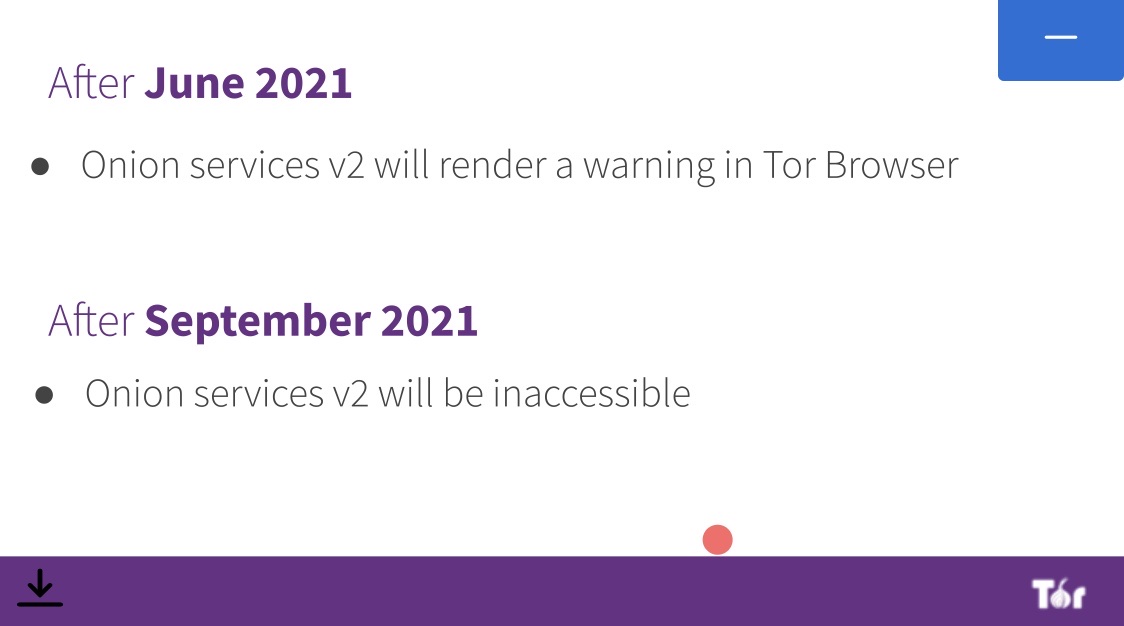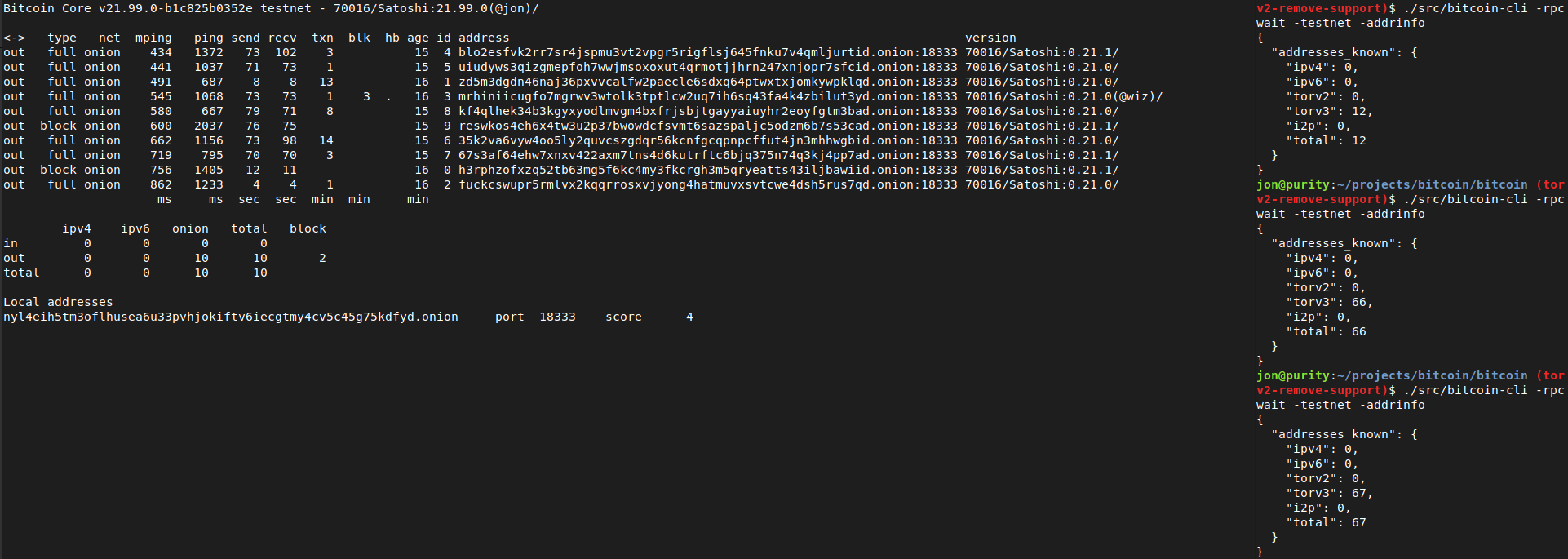5d82a57db4contrib: remove torv2 seed nodes (Jon Atack)5f7e086daccontrib: update generate-seeds.py to ignore torv2 addresses (Jon Atack)8be56f0f8ep2p, refactor: extract OnionToString() from CNetAddr::ToStringIp() (Jon Atack)5f9d3c09b4p2p: remove torv2 from CNetAddr::ToStringIP() (Jon Atack)3d39042144p2p: remove torv2 in SetIP() and ADDR_TORV2_SIZE constant (Jon Atack)cff5ec477ap2p: remove pre-addrv2 onions from SerializeV1Array() (Jon Atack)4192a74413p2p: ignore torv2-in-ipv6 addresses in SetLegacyIPv6() (Jon Atack)1d631e956fp2p: remove BIP155Network::TORV2 from GetBIP155Network() (Jon Atack)7d1769bc45p2p: remove torv2 from SetNetFromBIP155Network() (Jon Atack)eba9a94b9ffuzz: rename CNetAddr/CService deserialize targets (Jon Atack)c56a1c9b18p2p: drop onions from IsAddrV1Compatible(), no longer relay torv2 (Jon Atack)f8e94002fcp2p: remove torv2/ADDR_TORV2_SIZE from SetTor() (Jon Atack)0f1c58ae87test: update feature_proxy to torv3 (Jon Atack) Pull request description:  This patch removes support in Bitcoin Core for Tor v2 onions, which are already removed from the release of Tor 0.4.6. - no longer serialize/deserialize and relay Tor v2 addresses - ignore incoming Tor v2 addresses - remove Tor v2 addresses from the addrman and peers.dat on node launch - update generate-seeds.py to ignore Tor v2 addresses - remove Tor v2 hard-coded seeds Tested with tor-0.4.6.1-alpha (no v2 support) and 0.4.5.7 (v2 support). With the latest Tor (no v2 support), this removes all the warnings like those reported with current master in https://github.com/bitcoin/bitcoin/issues/21351 ``` <bitcoind debug log> Socks5() connect to […].onion:8333 failed: general failure <tor log> Invalid hostname [scrubbed]; rejecting ``` and the addrman no longer has Tor v2 addresses on launching bitcoind. ```rake $ ./src/bitcoin-cli -addrinfo { "addresses_known": { "ipv4": 44483, "ipv6": 8467, "torv2": 0, "torv3": 2296, "i2p": 6, "total": 55252 } } ``` After recompiling back to current master and restarting with either of the two Tor versions (0.4.5.7 or 0.4.6.1), -addrinfo initially returns 0 Tor v2 addresses and then begins finding them again. Ran nodes on this patch over the past week on mainnet/testnet/signet/regtest after building with DEBUG_ADDRMAN. Verified that this patch bootstraps an onlynet=onion node from the Tor v3 hardcoded fixed seeds on mainnet and testnet and connects to blocks and v3 onion peers: `rm ~/.bitcoin/testnet3/peers.dat ; ./src/bitcoind -testnet -dnsseed=0 -onlynet=onion`  Tested using `addnode`, `getaddednodeinfo`,`addpeeraddress`, `disconnectnode` and `-addrinfo` that a currently valid, connectable Tor v2 peer can no longer be added:  Thanks to Vasil Dimov, Carl Dong, and Wladimir J. van der Laan for their work on BIP155 and Tor v3 that got us here. ACKs for top commit: laanwj: Code review ACK5d82a57db4Tree-SHA512: 590ff3d2f6ef682608596facb4b01f44fef69716d2ab3552ae1655aa225f4bf104f9ee08d6769abb9982a8031de93340df553279ce1f5023771f9f2b651178bb
Bitcoin Core integration/staging tree
For an immediately usable, binary version of the Bitcoin Core software, see https://bitcoincore.org/en/download/.
Further information about Bitcoin Core is available in the doc folder.
What is Bitcoin?
Bitcoin is an experimental digital currency that enables instant payments to anyone, anywhere in the world. Bitcoin uses peer-to-peer technology to operate with no central authority: managing transactions and issuing money are carried out collectively by the network. Bitcoin Core is the name of open source software which enables the use of this currency.
For more information read the original Bitcoin whitepaper.
License
Bitcoin Core is released under the terms of the MIT license. See COPYING for more information or see https://opensource.org/licenses/MIT.
Development Process
The master branch is regularly built (see doc/build-*.md for instructions) and tested, but it is not guaranteed to be
completely stable. Tags are created
regularly from release branches to indicate new official, stable release versions of Bitcoin Core.
The https://github.com/bitcoin-core/gui repository is used exclusively for the development of the GUI. Its master branch is identical in all monotree repositories. Release branches and tags do not exist, so please do not fork that repository unless it is for development reasons.
The contribution workflow is described in CONTRIBUTING.md and useful hints for developers can be found in doc/developer-notes.md.
Testing
Testing and code review is the bottleneck for development; we get more pull requests than we can review and test on short notice. Please be patient and help out by testing other people's pull requests, and remember this is a security-critical project where any mistake might cost people lots of money.
Automated Testing
Developers are strongly encouraged to write unit tests for new code, and to
submit new unit tests for old code. Unit tests can be compiled and run
(assuming they weren't disabled in configure) with: make check. Further details on running
and extending unit tests can be found in /src/test/README.md.
There are also regression and integration tests, written
in Python.
These tests can be run (if the test dependencies are installed) with: test/functional/test_runner.py
The CI (Continuous Integration) systems make sure that every pull request is built for Windows, Linux, and macOS, and that unit/sanity tests are run automatically.
Manual Quality Assurance (QA) Testing
Changes should be tested by somebody other than the developer who wrote the code. This is especially important for large or high-risk changes. It is useful to add a test plan to the pull request description if testing the changes is not straightforward.
Translations
Changes to translations as well as new translations can be submitted to Bitcoin Core's Transifex page.
Translations are periodically pulled from Transifex and merged into the git repository. See the translation process for details on how this works.
Important: We do not accept translation changes as GitHub pull requests because the next pull from Transifex would automatically overwrite them again.